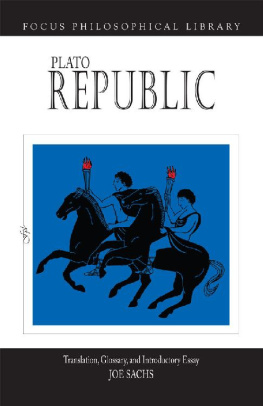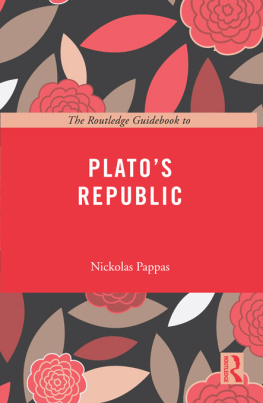Plato - The Republic
Here you can read online Plato - The Republic full text of the book (entire story) in english for free. Download pdf and epub, get meaning, cover and reviews about this ebook. genre: Science. Description of the work, (preface) as well as reviews are available. Best literature library LitArk.com created for fans of good reading and offers a wide selection of genres:
Romance novel
Science fiction
Adventure
Detective
Science
History
Home and family
Prose
Art
Politics
Computer
Non-fiction
Religion
Business
Children
Humor
Choose a favorite category and find really read worthwhile books. Enjoy immersion in the world of imagination, feel the emotions of the characters or learn something new for yourself, make an fascinating discovery.
The Republic: summary, description and annotation
We offer to read an annotation, description, summary or preface (depends on what the author of the book "The Republic" wrote himself). If you haven't found the necessary information about the book — write in the comments, we will try to find it.
The Republic — read online for free the complete book (whole text) full work
Below is the text of the book, divided by pages. System saving the place of the last page read, allows you to conveniently read the book "The Republic" online for free, without having to search again every time where you left off. Put a bookmark, and you can go to the page where you finished reading at any time.
Font size:
Interval:
Bookmark:
The Project Gutenberg EBook of Plato's Republic, by Plato
This eBook is for the use of anyone anywhere at no cost and withalmost no restrictions whatsoever. You may copy it, give it away orre-use it under the terms of the Project Gutenberg License includedwith this eBook or online at www.gutenberg.net
Title: Plato's Republic
Author: Plato
Release Date: May 22, 2008 [EBook #150]
Language: English
*** START OF THIS PROJECT GUTENBERG EBOOK PLATO'S REPUBLIC ***
by Plato
translated by Benjamin Jowett
THE Republic of Plato is the longest of his works with the exception ofthe Laws, and is certainly the greatest of them. There are nearerapproaches to modern metaphysics in the Philebus and in the Sophist;the Politicus or Statesman is more ideal; the form and institutions ofthe State are more clearly drawn out in the Laws; as works of art, theSymposium and the Protagoras are of higher excellence. But no otherDialogue of Plato has the same largeness of view and the sameperfection of style; no other shows an equal knowledge of the world, orcontains more of those thoughts which are new as well as old, and notof one age only but of all. Nowhere in Plato is there a deeper ironyor a greater wealth of humor or imagery, or more dramatic power. Norin any other of his writings is the attempt made to interweave life andspeculation, or to connect politics with philosophy. The Republic isthe centre around which the other Dialogues may be grouped; herephilosophy reaches the highest point to which ancient thinkers everattained. Plato among the Greeks, like Bacon among the moderns, wasthe first who conceived a method of knowledge, although neither of themalways distinguished the bare outline or form from the substance oftruth; and both of them had to be content with an abstraction ofscience which was not yet realized. He was the greatest metaphysicalgenius whom the world has seen; and in him, more than in any otherancient thinker, the germs of future knowledge are contained. Thesciences of logic and psychology, which have supplied so manyinstruments of thought to after-ages, are based upon the analyses ofSocrates and Plato. The principles of definition, the law ofcontradiction, the fallacy of arguing in a circle, the distinctionbetween the essence and accidents of a thing or notion, between meansand ends, between causes and conditions; also the division of the mindinto the rational, concupiscent, and irascible elements, or ofpleasures and desires into necessary and unnecessarythese and othergreat forms of thought are all of them to be found in the Republic, andwere probably first invented by Plato. The greatest of all logicaltruths, and the one of which writers on philosophy are most apt to losesight, the difference between words and things, has been moststrenuously insisted on by him, although he has not always avoided theconfusion of them in his own writings. But he does not bind up truthin logical formulae,logic is still veiled in metaphysics; and thescience which he imagines to "contemplate all truth and all existence"is very unlike the doctrine of the syllogism which Aristotle claims tohave discovered.
Neither must we forget that the Republic is but the third part of astill larger design which was to have included an ideal history ofAthens, as well as a political and physical philosophy. The fragmentof the Critias has given birth to a world-famous fiction, second onlyin importance to the tale of Troy and the legend of Arthur; and is saidas a fact to have inspired some of the early navigators of thesixteenth century. This mythical tale, of which the subject was ahistory of the wars of the Athenians against the Island of Atlantis, issupposed to be founded upon an unfinished poem of Solon, to which itwould have stood in the same relation as the writings of thelogographers to the poems of Homer. It would have told of a strugglefor Liberty, intended to represent the conflict of Persia and Hellas.We may judge from the noble commencement of the Timaeus, from thefragment of the Critias itself, and from the third book of the Laws, inwhat manner Plato would have treated this high argument. We can onlyguess why the great design was abandoned; perhaps because Plato becamesensible of some incongruity in a fictitious history, or because he hadlost his interest in it, or because advancing years forbade thecompletion of it; and we may please ourselves with the fancy that hadthis imaginary narrative ever been finished, we should have found Platohimself sympathizing with the struggle for Hellenic independence,singing a hymn of triumph over Marathon and Salamis, perhaps making thereflection of Herodotus where he contemplates the growth of theAthenian empire"How brave a thing is freedom of speech, which hasmade the Athenians so far exceed every other state of Hellas ingreatness!" or, more probably, attributing the victory to the ancientgood order of Athens and to the favor of Apollo and Athene.
Again, Plato may be regarded as the "captain" ('arhchegoz') or leaderof a goodly band of followers; for in the Republic is to be found theoriginal of Cicero's De Republica, of St. Augustine's City of God, ofthe Utopia of Sir Thomas More, and of the numerous other imaginaryStates which are framed upon the same model. The extent to whichAristotle or the Aristotelian school were indebted to him in thePolitics has been little recognized, and the recognition is the morenecessary because it is not made by Aristotle himself. The twophilosophers had more in common than they were conscious of; andprobably some elements of Plato remain still undetected in Aristotle.In English philosophy too, many affinities may be traced, not only inthe works of the Cambridge Platonists, but in great original writerslike Berkeley or Coleridge, to Plato and his ideas. That there is atruth higher than experience, of which the mind bears witness toherself, is a conviction which in our own generation has beenenthusiastically asserted, and is perhaps gaining ground. Of the Greekauthors who at the Renaissance brought a new life into the world Platohas had the greatest influence. The Republic of Plato is also thefirst treatise upon education, of which the writings of Milton andLocke, Rousseau, Jean Paul, and Goethe are the legitimate descendants.Like Dante or Bunyan, he has a revelation of another life; like Bacon,he is profoundly impressed with the unity of knowledge; in the earlyChurch he exercised a real influence on theology, and at the Revival ofLiterature on politics. Even the fragments of his words when "repeatedat second-hand" have in all ages ravished the hearts of men, who haveseen reflected in them their own higher nature. He is the father ofidealism in philosophy, in politics, in literature. And many of thelatest conceptions of modern thinkers and statesmen, such as the unityof knowledge, the reign of law, and the equality of the sexes, havebeen anticipated in a dream by him.
The argument of the Republic is the search after Justice, the nature ofwhich is first hinted at by Cephalus, the just and blameless oldmanthen discussed on the basis of proverbial morality by Socrates andPolemarchusthen caricatured by Thrasymachus and partially explainedby Socratesreduced to an abstraction by Glaucon and Adeimantus, andhaving become invisible in the individual reappears at length in theideal State which is constructed by Socrates. The first care of therulers is to be education, of which an outline is drawn after the oldHellenic model, providing only for an improved religion and morality,and more simplicity in music and gymnastic, a manlier strain of poetry,and greater harmony of the individual and the State. We are thus ledon to the conception of a higher State, in which "no man calls anythinghis own," and in which there is neither "marrying nor giving inmarriage," and "kings are philosophers" and "philosophers are kings;"and there is another and higher education, intellectual as well asmoral and religious, of science as well as of art, and not of youthonly but of the whole of life. Such a State is hardly to be realizedin this world and would quickly degenerate. To the perfect idealsucceeds the government of the soldier and the lover of honor, thisagain declining into democracy, and democracy into tyranny, in animaginary but regular order having not much resemblance to the actualfacts. When "the wheel has come full circle" we do not begin againwith a new period of human life; but we have passed from the best tothe worst, and there we end. The subject is then changed and the oldquarrel of poetry and philosophy which had been more lightly treated inthe earlier books of the Republic is now resumed and fought out to aconclusion. Poetry is discovered to be an imitation thrice removedfrom the truth, and Homer, as well as the dramatic poets, having beencondemned as an imitator, is sent into banishment along with them. Andthe idea of the State is supplemented by the revelation of a futurelife.
Next pageFont size:
Interval:
Bookmark:
Similar books «The Republic»
Look at similar books to The Republic. We have selected literature similar in name and meaning in the hope of providing readers with more options to find new, interesting, not yet read works.
Discussion, reviews of the book The Republic and just readers' own opinions. Leave your comments, write what you think about the work, its meaning or the main characters. Specify what exactly you liked and what you didn't like, and why you think so.


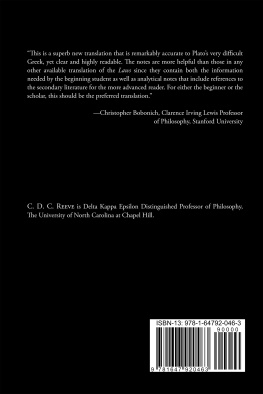
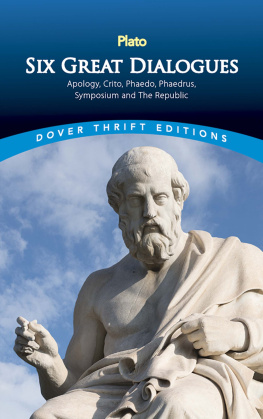

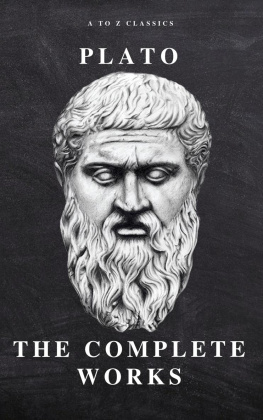

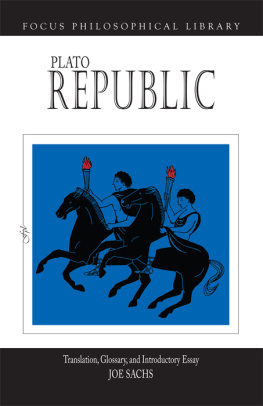
![Averroes on Platos Republic [trans. Ralph Lerner] (Cornell - Averroes on Plato’s Republic](/uploads/posts/book/324094/thumbs/averroes-on-plato-s-republic-trans-ralph.jpg)
